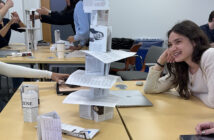
Madison Hoff
When I was a first-year student, I was always anxious to get an exam grade back. I avoided looking at the grade circled in red pen at the top of the page.
Instead, I flipped through the pages to see where I made mistakes. I had to see if I made a silly mistake or something I knew I could have studied for if only I studied another five minutes — 10 minutes.
Even if I got an A or a B+, I have always made excuses to myself about my grades.
I would think to myself, “If I just did one more practice problem, I wouldn’t have made that mistake.”
“If I read that chapter again, I would have understood the material better.”
This pressure I put on myself also made me compare myself to others.
I would feel like all of my friends were getting good grades in class and quickly finishing homework. So, why would I have to spend more time on my homework? Do they think I am not capable of doing well?
I can’t get poor grades because I need to make sure I am doing as well as everyone else. But then again, isn’t it better to make mistakes so I can learn from them?
But I think to myself, who has time to make mistakes when you have to pass your class and take the next required one? Without passing, how would I graduate on time with a high GPA, and get a good job?
Every time an exam or homework assignment is handed back to me, these aforementioned thoughts always race through my head.
These thoughts probably will not stop once I graduate. I expect that the strive for perfection will continue in my career.
Comparing myself to coworkers. Always wanting to do more. Having to be perfect.
But I am not the only one feeling the pressures of having to be perfect in college and beyond. There is a rise in college students who are perfectionists.
In a New York Times article titled “More College Students Seem to be Majoring in Perfectionism,” a new study shows that since 1989 social perfectionism has increased by 32 percent, and self-oriented perfectionism increased by 10 percent. This is the first study that looks at perfectionism rates by generation so further research may be needed.
The research found that social media influences and a rise in competition between peers led to the increase in perfectionism.
One of the study’s conclusions is that young people “are increasingly inclined to display perfection as a means of securing approval” as the demand to be socially accepted is a prominent role in this society. Not only are students being more self-critical, but they are holding the people around them to high standards.
I think it is challenging when we want to do well in our fields of study while getting a job we are not only happy with but also passionate about. There are so many of us trying to achieve this goal, so we compare ourselves to others’ success.
We shouldn’t be competing with our fellow classmates. We all just want to do well and have a valuable college experience.
Maybe I could have studied an extra 10 minutes for that exam, but I didn’t. I shouldn’t be upset over one grade. I can only do the best I can and know that a test grade does not define who I am. I think about my future goals and what makes me, me. Achieving high grades is great but it is not a talent.
I know that I am a hard-worker even if I cannot achieve the best grades all the time.
As a current junior, I know that college is meant to be challenging work.
However, one grade should not make me stressed. I try to balance my need for perfection with realistic standards. I know I cannot be perfect in everything I do.
College is competitive and so is the real world. All we can do is put in our best effort without overworking and support each other’s success.
—
Madison Hoff, ’19, is a data/graphics editor for The Brown and White. She can be reached at mgh319@lehigh.edu.





Comment policy
Comments posted to The Brown and White website are reviewed by a moderator before being approved. Incendiary speech or harassing language, including comments targeted at individuals, may be deemed unacceptable and not published. Spam and other soliciting will also be declined.
The Brown and White also reserves the right to not publish entirely anonymous comments.
2 Comments
Interesting, I couldn’t think about your subject while reading your article. I thought about being pleased with yourself, doing the best you could and trying to improve.
” “More College Students Seem to be Majoring in Perfectionism,” a new study shows that since 1989 social perfectionism has increased by 32 percent, and self-oriented perfectionism increased by 10 percent.” This means more pressure and stress. I hope more students question perfectionism, as you have done.
Great Article, It reminds me my early days when I wanted to be a perfect person. But with the time and experience of life, I found that too much perfectionism can lead to an unwanted lag in your work and your daily lifestyle. Perfectionism is linked with normality to check whether you work normally or with too much off perfectionism. How normal am I? This is an anticipating question you all have. Perfectionism is one hand, it can motivate you to perform at a high level and deliver top-quality work. On the other hand, it can cause you unnecessary anxiety and slow you down. You can read more about an very interesting article about How normal I am?